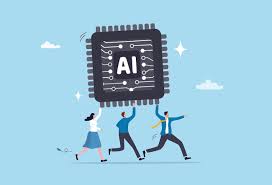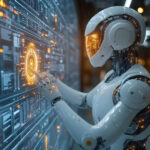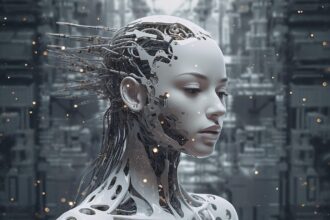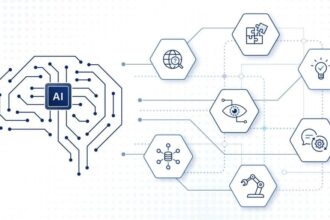Picture this: you’re sitting in your favorite coffee shop, watching someone solve a crossword puzzle while their phone suggests the perfect playlist based on their mood. Meanwhile, across the street, a delivery robot navigates traffic while a human artist creates a mural that moves people to tears. This scene captures the fascinating dance we’re witnessing between artificial intelligence and human intelligence – and it’s just the beginning.
We’re living through one of history’s most intriguing face-offs, though calling it a “versus” situation might be missing the point entirely. The real question isn’t necessarily who wins, but how these two forms of intelligence will reshape our world over the next decade. Spoiler alert: the answer’s more nuanced (and honestly, more exciting) than you might think.
Let’s be honest – this isn’t your typical David vs. Goliath story. It’s more like watching two master chefs work in the same kitchen, each bringing completely different skills to create something extraordinary.
The Current State of Play
Here’s where things stand today: AI has become incredibly good at specific tasks. We’re talking about systems that can diagnose diseases, translate languages in real-time, and even write poetry that’ll give you goosebumps. But here’s the thing – ask that same AI to explain why a joke is funny or comfort a friend going through a breakup, and you’ll quickly see the limitations.
Human intelligence, on the other hand, remains remarkably adaptable. You can wake up tomorrow and decide to learn salsa dancing, comfort a crying child, solve a complex work problem, and appreciate a beautiful sunset – all in one day. That’s the kind of versatility that’s still uniquely ours.
The interesting part? We’re not really competing on the same playing field. Think of it like comparing a Formula 1 race car to a Swiss Army knife. Both are impressive, but they excel in completely different ways.
Where AI is Already Winning
Let’s give credit where credit’s due – AI is absolutely crushing it in several areas, and the next decade will only amplify these strengths.
Data Processing and Pattern Recognition
AI can analyze millions of data points faster than you can say “machine learning.” In healthcare, systems are already detecting cancers earlier than human doctors in some cases. In finance, algorithms are spotting fraudulent transactions in milliseconds. These aren’t just incremental improvements – they’re game-changers that save lives and protect livelihoods.
Consistency and Scale
Unlike humans (who might have off days, need coffee, or get distracted by cat videos), AI systems maintain consistent performance 24/7. They don’t get tired, stressed, or hangry. When you need something done the same way millions of times, AI is your champion.
Complex Calculations and Optimization
Remember when GPS directions were just suggestions that often led you into a lake? Modern navigation systems process traffic patterns, weather conditions, and road closures in real-time to get you there faster. AI excels at juggling thousands of variables simultaneously to find optimal solutions.
The Uniquely Human Advantage
But here’s where humans shine – and likely will continue to dominate for the foreseeable future.
Emotional Intelligence and Empathy
You know that feeling when someone just gets what you’re going through? That’s pure human magic. We read between the lines, pick up on subtle cues, and respond with genuine understanding. While AI can recognize emotions, truly feeling and responding with authentic empathy remains our superpower.
Creativity and Innovation
Sure, AI can generate impressive artwork and write compelling stories, but human creativity comes from lived experiences, emotions, and that beautiful unpredictability of human thought. The artist who creates because they need to express something deep inside, the inventor who sees solutions where others see problems – that spark of innovation is distinctly human.
Ethical Reasoning and Moral Judgment
Making decisions that consider not just efficiency but fairness, compassion, and long-term consequences for society? That’s complex moral reasoning that requires understanding context, culture, and the human experience. AI might follow programmed ethical guidelines, but humans navigate the gray areas of moral decision-making with wisdom earned through experience.
Adaptability and Learning
Here’s what’s remarkable about human intelligence: you can learn to ride a bike, then years later use those same balance and coordination skills for snowboarding. We transfer knowledge across completely different domains in ways that still amaze AI researchers.
The Collaboration Sweet Spot
Here’s the plot twist – the most exciting developments aren’t happening when AI and humans compete, but when they collaborate. Think of it as the ultimate buddy cop movie, where each partner’s strengths complement the other’s weaknesses.
In medicine, AI analyzes thousands of medical scans while doctors provide the human touch, understanding patient fears and making treatment decisions that consider quality of life. In creative fields, artists use AI tools to explore new possibilities while bringing their unique vision and emotional depth to the work.
The next decade will likely see this partnership deepening. AI will handle the heavy computational lifting, freeing humans to focus on strategy, creativity, and relationship-building. It’s not about replacement – it’s about augmentation.
Looking Ahead: The Next Decade’s Game-Changers
So what can we expect as we look toward 2035? The landscape’s shifting rapidly, and several trends are worth watching.
AI will likely master more cognitive tasks – expect systems that can engage in more sophisticated reasoning and even display what looks like creativity. But they’ll still be following patterns learned from human-created data, not generating truly original insights from lived experience.
Humans will become more valuable, not less – as AI handles routine tasks, human skills like emotional intelligence, ethical reasoning, and creative problem-solving will become premium commodities. The jobs of the future will likely require more uniquely human capabilities.
The integration will deepen – we’re heading toward a world where AI assistance becomes as natural as using a smartphone today. The question won’t be “human or AI?” but rather “how can human intelligence and AI work together most effectively?”
The Real Winner? All of Us
Here’s the truth that might surprise you: framing this as a competition misses the bigger picture. The real winner in the AI vs. human intelligence debate is humanity itself – but only if we play our cards right.
The next decade won’t be about one form of intelligence defeating the other. Instead, we’re moving toward a future where AI amplifies human capabilities, handling the computational heavy lifting while we focus on what makes us uniquely human: our ability to love, create, empathize, and find meaning in existence.
The most successful people and organizations of the next decade will be those who learn to dance with AI, not against it. They’ll use artificial intelligence to enhance their human intelligence, creating solutions and experiences that neither could achieve alone.
So who wins? We all do – if we’re smart about how we navigate this incredible partnership that’s just getting started. The future isn’t about human versus machine; it’s about human with machine, and that’s a combination that’s pretty hard to beat.








